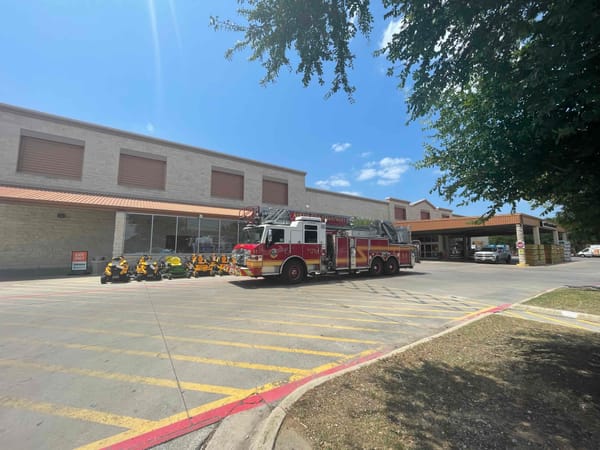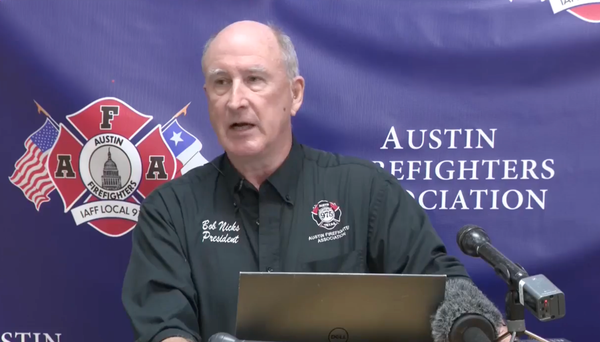Cronk gives Council one more middle finger
The embattled CM tries to undermine a Council deal on police oversight.
Council trims down Austin Energy audit: A resolution that was originally intended to direct the City Auditor to investigate how the utility prepared and handled the ice storm has been narrowed to focus just on vegetation management, following an amendment by CM Ryan Alter. I still think there should be some outside review of the utility's technical response, but hopefully it can be done by a group with greater utility expertise than the city auditor.
Council puts imposter police accountability measure on ballot: City Council had no choice but to put the 2nd "Austin Police Oversight Act" on the May ballot, right below another measure with the same name. In order to reduce confusion for voters, Mayor Kirk Watson successfully proposed inserting in the ballot language that the first measure was "circulated by Equity Action," the criminal justice reform group. Again, the fact that the police union has already spent $270k trying to get this measure on the ballot undermines their professed confidence that Equity Action's measure will get struck down in court.
Even the fire stations lost power: 23 of the fire department's 51 stations lost power at some point lost week, along with many EMS stations. Some of them had access to backup generators; others did not. I've also been told that some of the rec centers that served as warming centers lost power; the city did not have generators on hand to keep the lights on, but fortunately they were able to move people to other facilities.
Demand for generators spikes, obviously: KXAN has a map showing where in Austin people are filing for home generator permits. I don't know how many people who install generators bother filing permits –– it may only be a small fraction of the total. But unsurprisingly the great majority of the permits were for homes west of Mopac.
Why so many Austin sidewalks end mid-block: Audrey McGlinchey of KUT looks at the evolution of attitudes and policies on sidewalks in Austin, which has resulted in a patchwork of pedestrian infrastructure that includes 1,600 miles of missing sidewalks. My own neighborhood, built in the late 50's, lacks sidewalks. It's wild to me that it wouldn't be a standard thing to put in place for a subdivision builder at one time...I wonder what the cost-benefit analysis was from the developer's perspective.
Cronk ignores Council again
Less than a day after it became clear that City Council wanted him to negotiate a one-year contract with the police association, City Manager Spencer Cronk announced that the city had reached a four-year deal.
The proposed contract would raise base pay by 14% over four years. It would offer the Office of Police Oversight access to investigations of police officers being conducted by APD's internal affairs unit, which it currently lacks, but it would not allow OPO to investigations independent of the police department. In terms of oversight, it falls far short of the framework put forth by Equity Action that voters will be able to approve in May.
I outlined yesterday the reasons why Council members and advocates for greater police oversight favor a one-year contract, but the more important point here is that Cronk is once again stepping into an advocacy and policymaking role that is not part of his job.
Now, Cronk can feign innocence and claim that, after nearly a year of bargaining, it's just a coincidence that his team finalized a four-year deal with the police union hours after it became clear there was majority support on Council for a one-year deal. He can claim that he hadn't yet gotten explicit direction from Council (in the form of a resolution) to abandon a four-year contract.
But a city manager who understands and respects his role would not have done what Cronk did today. He is either utterly oblivious or utterly indifferent to the wishes expressed by his employer. Both explanations lead to the same conclusion: Cronk's termination.
Cronk's special relationship with the cops
In other policy arenas, the most common criticism of Cronk is that he simply too deferential to the executives who serve beneath him, even when they prove incompetent or intransigent. He is accused of not showing much interest in what's going on in the many departments he oversees.
With the police, however, Cronk appears attached at the hip. He didn't fire APD Chief Brian Manley despite a unanimous resolution of no confidence passed by Council. He made a point of accompanying current Police Chief Joe Chacon to denounce the indictments of police officers accused of hurting protesters during the 2020 demonstrators. And now this.
It appears Cronk feels a greater obligation to do what the police department's leadership wants than what his actual employers want. This is untenable.





